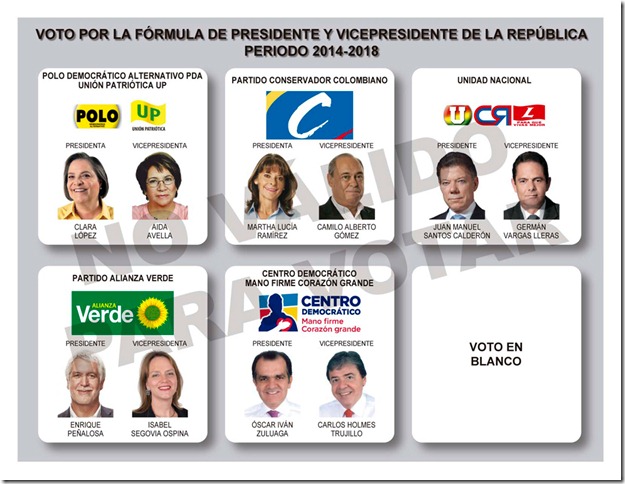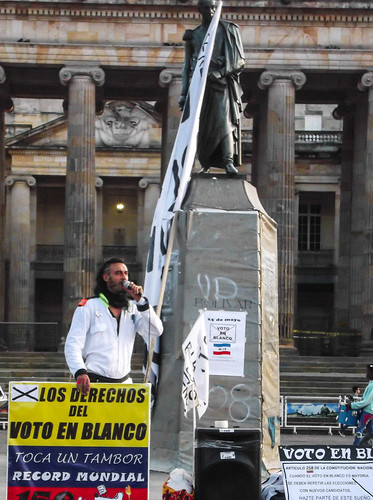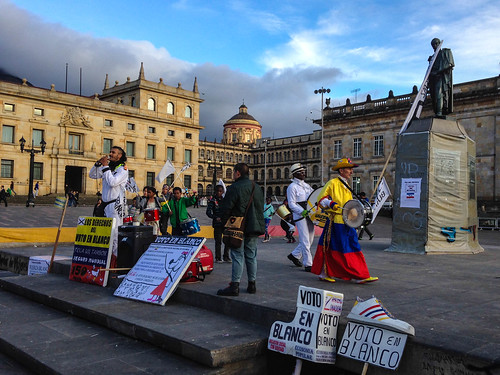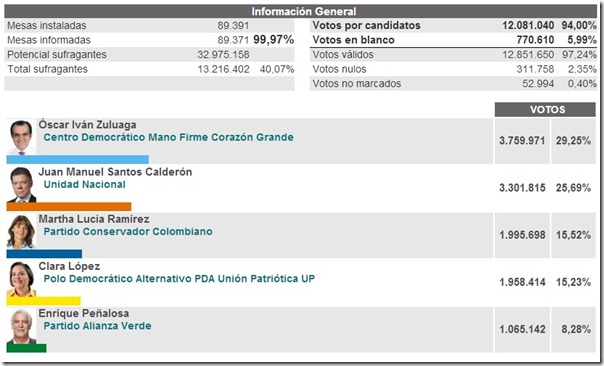Colombia’s Presidential Elections
Looking back at the first round and forward to the second.
 As I noted earlier this week, Colombia held the first round of their presidential elections on Sunday, May 25. Here is a run down of the first round and thoughts about the pending second, which will take place on Sunday, June 15.
As I noted earlier this week, Colombia held the first round of their presidential elections on Sunday, May 25. Here is a run down of the first round and thoughts about the pending second, which will take place on Sunday, June 15.
SOME BASICS
The current President, Juan Manual Santos is running for re-election and he faced four challengers in the first round (the Colombian constitution of 1991 created a requirement that president be elected with 50%+1 of the popular vote, which requires the possibility of a two-round process). Santos’ main challenger (Óscar Iván Zuluaga) is from his right (Santos himself is roughly center-right). Going into the first round (and now into the second) finds a very close contest between the two, with Zuluaga having a slight upper hand.
Santos entered the re-election process somewhat damaged, with his image tainted by pork barrel politics (called “mermelada or “marmalade” in Colombian political vernacular) which many in Colombia see as corruption (or, at least, clientelism). He also has had faced strikes by agricultural workers and teachers.
The campaign itself has been full of mud-slinging and scandals. In terms of the more dramatic examples there was first the resignation from the Santos campaign of a major advisor, J. J. Rendón (sort of a Latin American Carl Rove), who was accused of taking money from nacrotraffickers (Reuters: Colombia president’s election strategist quits over bribe claim):
An election campaign advisor to Colombia’s President Juan Manuel Santos resigned on Monday amid allegations that he took a $12 million bribe to prevent the extradition of a suspected drug trafficker to the United States.
Venezuelan political guru JJ Rendon, one of several advisors to Santos, denied the accusations in a statement, and said they were part of a plot to tarnish the reputation of the president ahead of elections on May 25.
Further allegations were made (by President Uribe) that some $2 million of that money was funneled to the Santos campaign. However, Uribe (who is backing Santos’ opponent) said he will only provide evidence of the allegation if the authorities open up an investigation. No evidence has been forthcoming to my knowledge.
Meanwhile, the Zuluaga campaign had its own scandal involving a hacker on his staff (actually a broker of hacked information) who had illegally intercepted information from the peace process with the FARC. Part of the scandal was that Zuluaga claimed not to have known the individual, but then a video was released showing he had had a meeting with the individual (CNN: Alleged hacker video roils last days of Colombian presidential campaign):
Andrés Sepúlveda, 29, was arrested on May 5 and accused of “managing an illegal office dedicated to intercepting emails from between those close to the peace dialogues in Havana (Cuba),” according to a news release published by the Colombian attorney general’s office.
Zuluaga both admitted to having known Sepúlveda more than he had previously admitted, but also claimed that the video was a fake. It is believed that the Santos campaign has more videos that will be released soon.
Interestingly, Sepúlveda has links to the aforementioned Rendón as well. This fact has been exploited by the Zuluaga campaign to allege dirty tricks all around.
It is unclear as to how much the video hurt Zuluaga in the first round (if at all), as Colombian law stops polls a week before the election (and that last poll taken was before the hacker scandal came to light). If one compares the last polls to the results, one finds a pretty close match. Zuluaga supporters will argue that his support was growing heading in to the first round and that the hacker scandal stopped that growth and sent a lot of votes to third-place finishers, Martha Lucia Ramírez.
Many Colombians that I talked to in the week before the election described it as the worst ever. However, in a testament to both short memories and the degree to which Colombian politics have, in fact, improved, I couldn’t help but think back to the 1990 contests in which three candidate were assassinated with a fourth dramatic attempt that failed. In that cycle, Liberal Luis Carlos Galán, who was the clear favorite to win, was gunned down at a campaign rally south of Bogotá, UP candidate Bernardo Jaramillo Ossa was gunned down at the airport, and Carlos Pizarro Leongómez (M-19) was shot on a plane. Additionally, a plane that was supposed to be carrying Liberal candidate (and later President) César Gaviria was bombed, but he was not aboard.
And, of course, in the 1994 campaign ended up being definitively tainted by Cali cartel drug money, which almost led to the impeachment of the president (Ernesto Samper) and the eventual jailing of his campaign manager, and later Defense Minister (Fernando Botero Zea).
As such, hackers and alleged bribes are more than tame.
THE CANDIDATES
The ballot was as follows:
These were paper ballots which are marked with a pen. Voters can choose on of the five candidates or the “en blanco” box (which is legally “none of the above”).
The candidates were, starting in the top left corner:
1. Clara López: She was the candidate of the left in this election leading an alliance of the Alternative Democratic Pole and the Patriotic Union. Both parties have historic linkages to the non-violent left as well as to demobilized guerrilla groups. The UP, which emerged from peace talks with the FARC in the 1980s, has a tragic history of near elimination by paramilitary groups who murdered hundreds of UP members in the late 1980s/early 1990s.
2. Martha Lucia Ramírez: The Conservative Party candidate was, among other things, a former Senator as well as Defense Minister in the Uribe administration (2002-2003). The Conservatives are of the right, although she was not the most rightward candidate in the race (see #5 below). The party is one of the two oldest in the country (along with the Liberals), dating back to the 19th century.
3. Juan Manuel Santos: The incumbent president headed the coalitional ticket of La U (Social Party of National Unity, Radical Change, and the Liberal Party). Santos comes from a traditional political family (one of his great-great uncles was President, his family long owned the most significant newspaper in the country, El Tiempo, his cousin was Vice President, etc.). He himself has served in various ministerial positions, most significantly as Defense Minister in the Uribe administration during a time of significant successes against the FARC (2006-2009). His only elected office held has been the presidency.
4. Enrique Peñalosa: The centrist in the race as the Green Party candidate. Peñalosa was a mayor of Bogotá (98-01). He is considered a fairly effect administrator, but not an especially effective politicians. He is a bit of a policy wonk.
5. Óscar Iván Zuluaga: Zuluaga is the candidate of the newly formed Democratic Center party created by former President Álvaro Uribe for his successful Senate run in March. Zuluaga has been a mayor and senator and served as Finance Minister in the Uribe administration (2007-2010). He is the most rightward candidate in the race. The party’s slogan is “Firm hand, big heart.”
6. En blanco: If “en blanco” were to win, then a new set of elections would have to be held with all new candidates. Indeed, for the first time to my knowledge, there was an active campaign to get people to vote “en blanco.”
For example, here were some folks trying to rally voter in the Plaza de Bolívar (in front of the capitol building):
There were also posters all over Bogotá—however, the blank vote won only in the single digits (see below).
Voters could also spoil their ballot (voto en nulo), which some people do rather deliberately. When I observed vote counting I saw ballots with giant x’s over the entire document or, even, each candidate individually crossed out. Voters sometime deposit their ballots unmarked.
THE RESULTS
As the below shows (from the National Registry), the second round is to be a contest between Zuluaga and Santos.
It is also worth noting that the turnout was low (only 40%—the lowest in 12 years). One of the questions, therefore, for the second round is whether there will be a larger turnout in the second round, or whether the general apathy will continue.
THE URIBE FACTOR
One of the names that one should have noted in the above list of candidate is “Uribe.” Álvaro Uribe was president of Colombia for two terms, 2002-2006 and 2006-2010 (and was elected to the Senate in March of 2014). Uribe was arguably the most popular president in Colombian history—indeed, the constitution was amended to allow him to run for a second term and was almost amended to allow a third term, but the Constitutional Court blocked the change at the 11th hour in 2010, which led to the candidacy and election of Santos in 2010 (at that point, the candidate supported by Uribe).
While many Colombians credit Uribe with dramatic diminutions of violence in Colombia during his time in office, including a number of successes against the FARC, he also is linked to a number of scandals, including human rights abuses, wiretapping political opponents, and ties to paramilitaries. The wiretapping scandal was so large that the bureaucracy that was linked to it (the DAS–which was a major government agency that dealt with any number of issues, including immigration and national ID cards) was totally dismantled.
The former President and current Senator Uribe casts a long shadow over Colombian politics: of the five candidates in the race, three served in the Uribe administration (Santos, Ramírez, and Zuluaga) and a fourth, Peñalosa, was at one time politically allied with Uribe.
Uribe has split with his former Defense Minister Santos over the issue of peace talks with the FARC (which have been under way in in Havana since 2012). Uribe opposes the peace process, and instead believes in a hardline approach to the rebels. Uribe’s chosen candidate, Zuluaga, is willing to pursue the peace talks, but only with conditions that are almost tantamount to peace without negotiations (therefore are tantamount to scuttling the peace process).
Indeed, one could argue that Zuluaga’s chief strength and chief weakness is Uribe. The strength comes from the fact that, as noted, many Colombians still adore Uribe and see his path as one to victory over the FARC and other violent actors. The weakness comes from the fact that many see Zuluaga as nothing more than a puppet so that Uribe can have the third term in office he wanted all along. As former President Samper stated: “Zuluaga does not have the character to say no to Uribe” (Semana: “Zuluaga no tiene el carácter para decirle no a Uribe”: Samper).
THE SECOND ROUND
The main issue at stake in terms of policy issues in the second round is that of the peace process. The general economic policy directions of the country will likely remain the same no matter the outcome, although many argue that the country would be far better off from a growth and international investment point of view if the peace process were to continue.
The electoral math goes something like this: the Polo voters will not go to Zuluaga and it is unlikely that the Verde voters will either (and the left has endorsed Santos). The Conservatives will split. Martha Lucia Ramírez has endorsed Zuluaga,but the vast majority of the Conservative congressional delegation has endorsed Santos (42 of 60 in both chambers: Conservadores se suman a la reelección de Santos).
A major question is turnout—will the second round see more voters than the first? Without a doubt both campaigns will spend a lot of money trying to get out their vote. Of course, the truth of the matter is that the country will be far more focused on the World Cup match against Greece on Saturday than they will on the Sunday elections (and there is afternoon match of Switzerland v. Ecuador on election day to distract voters as well).
The polls indicate that the candidates are nearly tied, with Zuluaga having a slight edge (47-45). The peace process debate is very much between those who simply want a firm hand against those they see as criminals and those who argue that a lasting peace requires a political agreement (keep in mind that the FARC turned 50 this past week—so they have demonstrated staying power).
All signs point to a “voto finish” on June 15th.





“If “en blanco” were to win, then a new set of elections would have to be held with all new candidates”
Is that true? I see people saying the same thing here in Brazil, but there is no provision in the law pointing out to that(Just that there should be new elections if there are a majority of the votes cancelled due to fraud).
@Andre Kenji:
Yes, there constitutional provision for an actual “none of the above” although the law varies as to application. If it had won a majority in the first round, it would have required a whole new set of candidates. In the second round, however, this is not the case (due to, if memory serves, a legal opinion, but it may be written in the law).
There have been several examples of mayoral races where this has actually happened..
The rules in congressional elections are slightly different–a new election, but not a full new slate of candidates (I would have to look up the specifics).
From my article on ballots: “This has happened a handful of time in local elections, with the most recent being a mayoral contest in 2011. A candidate running unopposed in Bello, Antioquia lost to en blanco 56.70% to 43.29%. See El Pais 2011 and Radio Santa Fe 2011.”
Dr. Taylor,
I want to thank you for this sort of post. Latin America is an area I don’t know nearly as well as I should and this allows me to learn a little in the limited time I have.
@Ben Wolf: I appreciate you saying so (as it unclear how many people even read these types of posts 🙂
I suspect more than you may realize. I for one rarely comment on them because I am not knowledgeable enough on latin american history and culture to contribute much that is worthwhile.